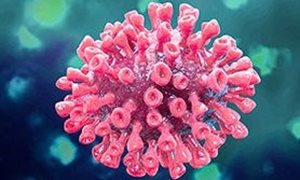21 February 2019
Hopman and the interdisciplinary team involved in the risk assessment identified the new infection route of Pseudomonas aeruginosa after a patient became infected with this carbapenem-resistant bacterium after lung surgery. The infection was remarkable because resistant Pseudomonas is rare in the Netherlands. In developing countries, the bacterium is much more common, but the patient had not travelled at all. The infection would probably have to come from the hospital itself.
After examination of various possible sources of infection, the sanitary facilities in the hospital proved to be the most likely source. The stagnant water in shower wells and drains turned out to be a growth medium for the resistant bacteria. Air measurements showed that the bacteria could move through the air when the shower was switched on. Hopman's research exposes a hitherto unknown mechanism for the spread of such resistant bacteria.
“The hospital environment is part of the puzzle of the spread of this bacterium,” says Hopman. “Now that we know that, we have to consider this in the new building plans for our hospital. We will work together with our building department to reduce the risk of infection. For example, we could consider moving the sinks from the patient rooms.”
“It is important to look for solutions in multidisciplinary fields,” emphasizes Hopman, “and collaborate with builders, engineers and infection experts. Of course, patients should be able to shower in the hospital. It is important to ensure that infections with resistant bacteria are kept to a minimum. This year we are planning a meeting in Nijmegen, where we will work with several national and international experts to find solutions, enabling other hospitals also to take the right measures to minimize the spread of resistant bacteria.”
publication
Risk Assessment After a Severe Hospital-Acquired Infection Associated With Carbapenemase-Producing Pseudomonas aeruginosa.
Hopman J, Meijer C, Kenters N, Coolen JPM, Ghamati MR, Mehtar S, van Crevel R, Morshuis WJ, Verhagen AFTM, van den Heuvel MM, Voss A, Wertheim HFL.
Joost Hopman and Heiman Wertheim are members of theme Infectious diseases and global health.
 Researchers at Radboudumc have discovered a new way of how resistant hospital bacteria can spread. In a case study on JAMA Network Open, physician microbiologist Joost Hopman describes how the rare bacterium Pseudomonas aeruginosa could spread infection from shower drains in patient rooms. He recommends measures be taken in the design of hospital rooms to minimize the risk of spreading from drainage points.
Researchers at Radboudumc have discovered a new way of how resistant hospital bacteria can spread. In a case study on JAMA Network Open, physician microbiologist Joost Hopman describes how the rare bacterium Pseudomonas aeruginosa could spread infection from shower drains in patient rooms. He recommends measures be taken in the design of hospital rooms to minimize the risk of spreading from drainage points.
Hopman and the interdisciplinary team involved in the risk assessment identified the new infection route of Pseudomonas aeruginosa after a patient became infected with this carbapenem-resistant bacterium after lung surgery. The infection was remarkable because resistant Pseudomonas is rare in the Netherlands. In developing countries, the bacterium is much more common, but the patient had not travelled at all. The infection would probably have to come from the hospital itself.
After examination of various possible sources of infection, the sanitary facilities in the hospital proved to be the most likely source. The stagnant water in shower wells and drains turned out to be a growth medium for the resistant bacteria. Air measurements showed that the bacteria could move through the air when the shower was switched on. Hopman's research exposes a hitherto unknown mechanism for the spread of such resistant bacteria.
“The hospital environment is part of the puzzle of the spread of this bacterium,” says Hopman. “Now that we know that, we have to consider this in the new building plans for our hospital. We will work together with our building department to reduce the risk of infection. For example, we could consider moving the sinks from the patient rooms.”
“It is important to look for solutions in multidisciplinary fields,” emphasizes Hopman, “and collaborate with builders, engineers and infection experts. Of course, patients should be able to shower in the hospital. It is important to ensure that infections with resistant bacteria are kept to a minimum. This year we are planning a meeting in Nijmegen, where we will work with several national and international experts to find solutions, enabling other hospitals also to take the right measures to minimize the spread of resistant bacteria.”
publication
Risk Assessment After a Severe Hospital-Acquired Infection Associated With Carbapenemase-Producing Pseudomonas aeruginosa.
Hopman J, Meijer C, Kenters N, Coolen JPM, Ghamati MR, Mehtar S, van Crevel R, Morshuis WJ, Verhagen AFTM, van den Heuvel MM, Voss A, Wertheim HFL.
Joost Hopman and Heiman Wertheim are members of theme Infectious diseases and global health.
Related news items

Chronic malaria infections produce more and more infectious gametocytes
28 April 2021 In a recent article in Nature Communications, researchers from the department of Medical Microbiology uncovered intriguing dynamics in the production of the transmission stages of malaria parasites, gametocytes. go to page
Invasive fungal infections in influenza and COVID-19
8 July 2020 The Aspergillus fungus is found in the lungs of many COVID patients. A parallel occurs with influenza patients, who often develop a serious fungal infection. Although such a serious fungal infection seems to occur less frequently in COVID-patients, alertness remains necessary, go to page
Early symptoms in Radboudumc healthcare workers who were tested for SARS-CoV-2
12 May 2020 In Eurosurveillance RIHS researcher Alma Tostmann and colleagues from the Radboudumc COVID-19 Team describe that general symptoms like fever, headache, general malaise and muscle ache were associated with a positive SARS-CoV-2 test. Respiratory symptoms however, were not predictive for SARS-CoV-2. go to page
Dealing with COVID-19 in low- and middle-income countries
26 March 2020 RIHS researcher Joost Hopman believes that low-and middle-income countries should intensify their preparedness for a possible COVID-19 outbreak. This was the core message of an opinion article that he wrote at the request of the medical journal JAMA. go to page
ERC Consolidator Grant for Bousema and Sechopoulos
12 December 2019 Teun Bousema and Ioannis Sechopoulos each receive an ERC Consolidator Grant of around two million euros. This European research subsidy will enable them to carry out research for the next five years. go to page
